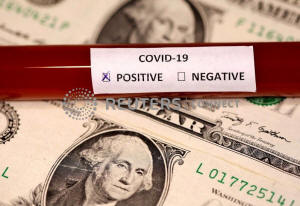Explainer: Coronavirus fears hit the market hard. How much did ordinary
Americans lose?
 Send a link to a friend
Send a link to a friend
 [March 11, 2020]
By David Randall [March 11, 2020]
By David Randall
NEW YORK (Reuters) - The deep declines in
the U.S. stock market over the last three weeks has left a dent in
retirement portfolios and brokerage accounts, costing on average each
person in the United States around $16,000 as of Monday's close before a
rebound Tuesday erased some of those losses.
Americans are mostly exposed to stocks via their 401(k) retirement
plans.
That does not account for wealth disparity and spread of ownership of
stock. According to an analysis of 2016 Federal Reserve data by Edward
Wolff, an economics professor at New York University, 84% of stocks
owned by U.S. households are owned by the wealthiest 10% of Americans.
Here is a breakdown of stock ownership and where ordinary investor's
risks lie:
WHY ARE AMERICANS SO EXPOSED TO THE STOCK MARKET?
The U.S. retirement system no longer relies on defined benefit pension
plans - which pay out a guaranteed amount until death. That means that
people are mostly in charge of their own retirement, investing via
401(k) pension plans.
It also means financial pain is personal. When the market fell 7.6% on
Monday, the average person became poorer by $5,682, according to
calculations by S&P Dow Jones Indices senior index analyst Howard
Silverblatt.

Around 42% of the working-age population with a full-time job has a
401(k) or similar plan, and those funds are overwhelmingly invested in
stocks, according to U.S. Census data.
According to the Investment Company Institute there are $5.9 trillion in
assets in 401(k) plans overall, with $3.8 trillion in mutual funds.
According to Morningstar, $1.7 trillion is invested in target-date funds
which have a target on when a person retires and are typically heavily
weighted to stocks.
WHY THE FOCUS ON STOCKS?
Investors - either through their own choosing or through target-date
funds or on the suggestions of financial advisers - focus heavily on
stocks because they can pay rich rewards. Stocks have returned an
average of 10.5% a year since 1970, according to Morningstar.
That is greater than the 8.3% annual return on bonds over the same time
according to Morningstar. Bonds, meanwhile, are unlikely to post the
same returns in the future because yields, which move lower as prices
rise, are at historic lows.
WHAT DO PEOPLE OWN OUTSIDE THEIR PENSIONS?
Overall, individual stock ownership in the United States appears to be
declining as more members of the outsized Baby Boom generation retire or
shift their portfolio to a more conservative stance in preparation for
retirement.
Approximately 55% of Americans reported that they owned stock in April
2019, down from the average 62% who reported owning equities in surveys
conducted between 2001 and 2008, according to Gallup data.
However, the popularity of exchange-traded funds, which allow investors
to bet on a trend or sector, has surged. There was $4.42 trillion in
ETFs listed in the United States overall at the end of 2019, according
to ETGI. That has grown by an average of 18.8% a year over the last 10
years.
[to top of second column]
|

A test tube labelled with the coronavirus is placed on U.S. dollar
banknotes, in this illustration taken on March 1, 2020. REUTERS/Dado
Ruvic

Individuals who own stocks outside of their retirement plans often
focus on popular large-cap names such as Walt Disney Co <DIS.N>,
Microsoft Corp <MSFT.O>, and Amazon.com Inc <AMZN.O>, according to
data from TD Ameritrade. Those who opt for exchange-traded funds
often gravitate toward those that invest based on a theme, such as
marijuana or automation, said Todd Rosenbluth, director of mutual
fund research at CFRA.
WHAT CAN INVESTORS DO?
Overall, investors pulled $13.6 billion out of funds that hold U.S.
equities last week, the sharpest pullback from the domestic stock
market since September, according to ICI data.
During Monday's market rout, individual investors turned to
technology companies such as Apple Inc <AAPL.O>, Microsoft, and
Amazon, according to data from Fidelity. Walt Disney, meanwhile, had
more than 5,000 buy orders through the brokerage firm compared with
1,094 sell orders.
"It's really about finding ports in the storm right now," said Katie
Nixon, chief investment officer at Northern Trust Wealth Management.
WHAT DID PEOPLE DO AFTER THE 2008 FINANCIAL CRASH?
Worker participation in 401(k) accounts fell by 3 percentage points
between 2007 and 2009, during which the United States suffered the
deepest recession since the Great Depression, according to a 2015
study in the Journal of Pension Economics and Finance.
Savings rates among those who continued contributing to their plans,
meanwhile, fell by 5 percentage points. Those changes in
contribution rates are likely to lower the 401(k) balance of a
typical 30-year-old by 8% by the time they reach the age of 62, the
study found.
HOW DOES THE STOCK MARKET FALL AFFECT THE ECONOMY?
Slightly more than half of all U.S. households have any exposure to
the stock market. Those people may feel less inclined to make big
purchases during a prolonged market rout. In addition, the larger
concern for the economy now is that the pullback in travel combined
with a collapse of oil prices will sink business and consumer
confidence and lead to a recession.

"It's very hard to tell people to stick to their plans and don't be
emotional because it's money, and everyone is emotional about
money," said JJ Kinahan, chief market strategist at TD Ameritrade.
(Reporting by David Randall; editing by Megan Davies and Lisa
Shumaker)
[© 2020 Thomson Reuters. All rights
reserved.] Copyright 2020 Reuters. All rights reserved. This material may not be published,
broadcast, rewritten or redistributed.
Thompson Reuters is solely responsible for this content. |